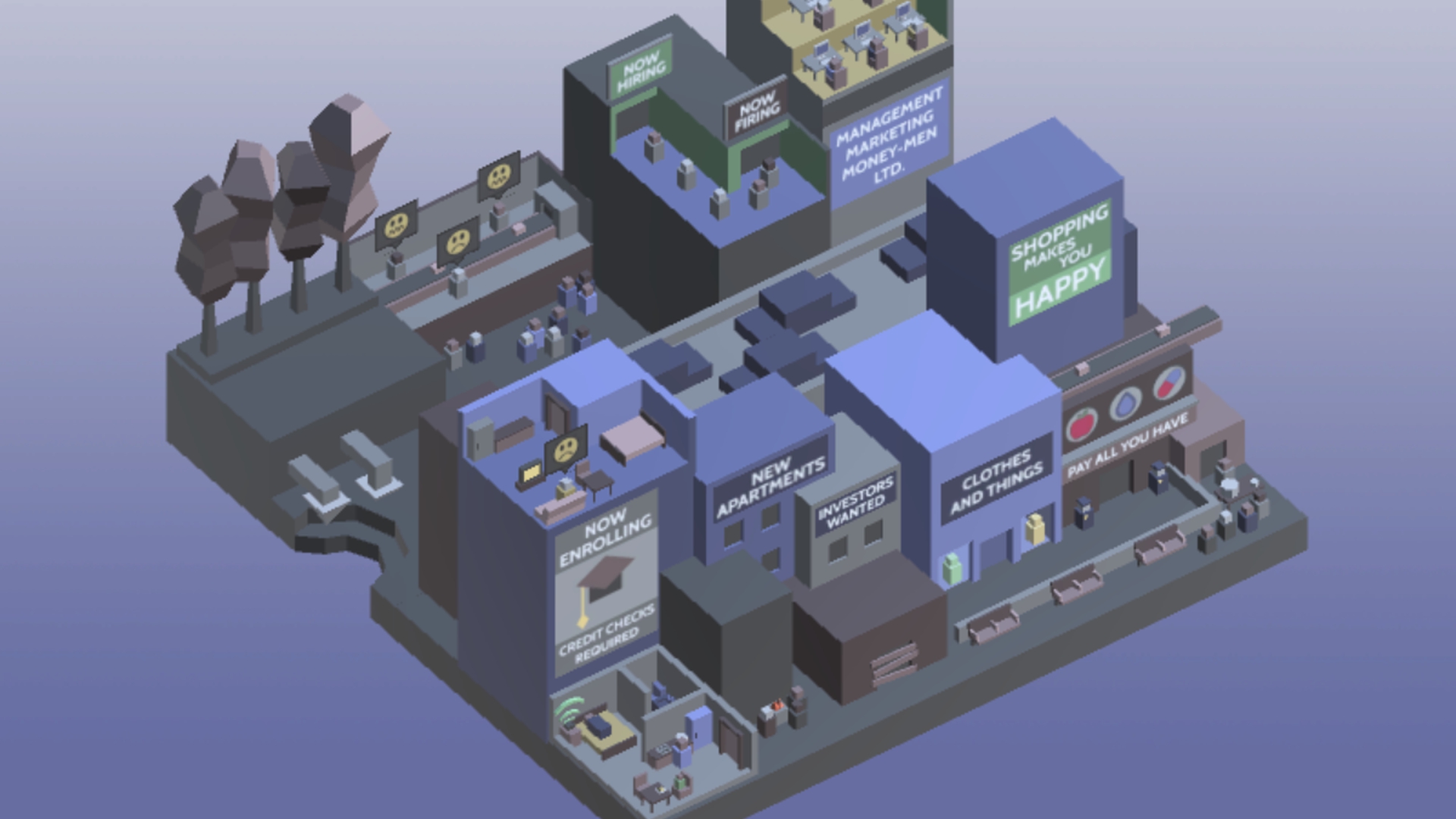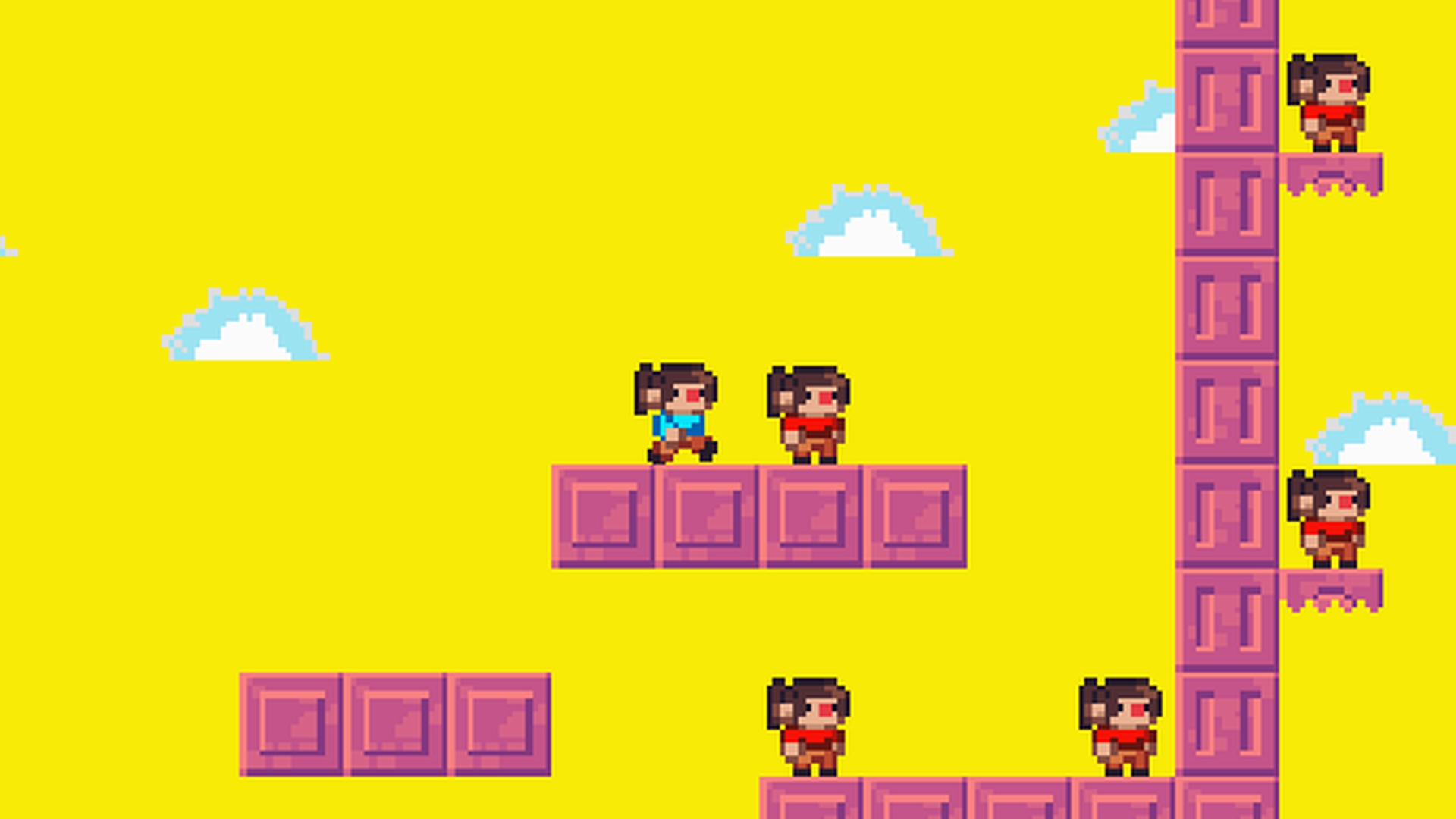Interview with Colestia
by
Jamie Woodcock (@jamie_woodcock),
Colestia (@colestia3)
June 25, 2019
Featured in Workers Game Jam (#9)
On making political games

inquiry
Interview with Colestia
On making political games
Jamie is an editor of Notes from Below
David is an indie gamedev who makes far-left games under the screen-name Colestia. He contributed A Worker’s Guide to Espionage to the game jam, and you can find more games here.
Ok to start off, can you tell us a bit about the games you’ve made and the themes they deal with?
I’ve made a bunch of games over the past few years, mostly dealing with left-wing theories and subjects. Some of them have been little simulations meant to teach people about particular left-wing concepts - so for example, my game Crisis Theory depicts a Marxist model of capitalist production, and the player has to keep it from falling into various crises. Other games (e.g. New Lethes, A Night in Nowhere have been about exploring urban environments and examining the ways in which capitalism shapes cities, inspired by the works of the Situationists. And then a lot of my more recent games have depicted what a positive socialist future could look like. So Post/Capitalism is a little city-builder where the player transforms a late-capitalist city into a socialist utopia. And my latest big game (A Bewitching Revolution) tells the story of the residents of a cyberpunk city who come together to build forms of collective power (with the help of a communist witch, controlled by the player). There are also a bunch of other little leftist games, and a couple of other less political games.
How would you describe your politics?
Broadly I’d say I’m some kind of libertarian socialist, but I try not to be too sectarian!
That’s broadly true of the NfB editors too! Can you tell us a bit more about how that politics shapes your game making practice?
I’d say that probably the main way my libertarian socialism specifically has influenced my games has been how I’ve depicted socialism. To the extent that socialism is represented in games, it’s mostly in management-type games like city builders (e.g. Tropico) or strategy games (e.g. Hearts of Iron IV). But that kind of managerial, centrally-planned socialism is pretty different from a libertarian socialist vision. So I’ve tended to avoid technocratic/systems-driven depictions of socialism, focusing instead on either broader ideals or more localised ideas of everyday socialism.
So given the different relationships between politics and games like Tropico, how do you understand that relationship more broadly?
Well yeah I mean obviously games are already political in the messages they convey, the ways they’re produced, the cultural roles they serve etc. But I guess to narrow things down a bit, I’m most practically engaged with representing leftist politics in/through games. I think that’s important because, on the one hand, games are a big part of our lives and a great place to get people thinking about radical politics. And on the other hand, if the left isn’t present in gaming then we’re effectively ceding this ground to the right.
I really appreciate both those points on games and politics. Could you elaborate a bit more about why games are an important medium for game-makers to think about politics? What is it about the form of media and so on?
Well in general I think that games as a medium are really well adapted to teaching people to intuitively understand systems (which makes them great for political education about capitalism), and also they’re very good at creating immersive and believable environments (which is great for depicting alternative political visions). More specifically I think gaming (or at least the AAA gaming industry) has had some pretty reactionary tendencies in recent times. A really straightforward example is the way that big-budget first person shooters have worked to glorify US military intervention (while being connected with the US military and weapons manufacturers). Or for another example, you could see in Gamergate and other conflicts over “gamer” identity the same sort of alt-right playbook that’s resurgent all over the world at the moment. So yeah, when the politics you most commonly see in the gaming world are explicitly right-wing, that suggests to me that the left needs to be a lot more present in these spaces.
So from that, can you tell us a bit about your entry to the jam?
My entry is based on an IWW organising technique referenced in this article (and a bunch of others), called mapping your workplace. The idea is to get an understanding of the physical and social geography of your workplace so that you know about potential allies and potential problems before you jump into organising. So the game pretty much involves the player talking to their co-workers and mapping their workplace, but with the aesthetic of a 70s spy film.
Did you have any challenges thinking about how to make a game about organising at work? are there mechanics that work well/don’t work in this context? I’m thinking mainly about the focus on player agency.
Absolutely! Games typically cast the player as a singular hero, who solves everyone’s problems through their actions alone. But in an organising context, it’s collective power that gives even the possibility of change. So I think it’s really important to avoid individualising stories of collective action (although to be honest, I pretty much just side-stepped those issues by limiting my game to the very earliest stages of organising).
Absolutely! Ok, so I’ve got to ask now: what’s the deal with the Karl Marx skateboarding game?
That’s the next big project I’m working on! It started out as a joke when I was on the Video Games Are The Worst Thing on Earth podcast, but I started prototyping it and got an insanely positive response. It’s essentially a Tony Hawk-style skating game, but with all sorts of Marxist theory embedded in the mechanics, objectives, and environment design. As a project, it fits kind of perfectly with some stuff I’ve been thinking about, that is how to make games which are clearly pop culture, but still have a strong leftist message. But at this stage it’s still very much in development, so I’m very open to ideas (and especially trick names, haha).
I think the Marx and pop culture game idea is really good! I’d be more than happy to offer up my pun skills for trick names too (although I can hear the other NfB editors groaning at the bad puns already…). Can you tell us a bit more on the “games which are clearly pop culture” angle? I’ve always thought about political games as either “Political games” (as in really obviously big p Political) and “games about politics” which use the mechanics and storytelling etc to do something more complex.
Haha, yeah well any pun ideas would definitely be appreciated! And I guess I think that consciously political games can try to achieve different things / reach different audiences. So there are educational political games, where the main purpose is teaching the player about political concepts or persuading them of a particular argument. There are ‘artistic’ (for lack of a better word) political games, where the goal is to experiment with new ways of representing/engaging with political questions. And then there are pop-culture political games, where the goal is to make something with mass appeal which carries a political argument to a mass audience. I can’t think of many examples in gaming (maybe Night in the Woods, although it also definitely does interesting stuff with it’s narrative structure). The best example I can think of is the movie The First Purge. In terms of structure/style it’s just a good action movie, but it makes a bunch of great political arguments in really straightforward ways - crime is caused by poverty, capitalism kills off people who are surplus to the needs of production, there’s a nexus between white nationalism and the police/military, etc.. To me it seems worthwhile to have more games in that kind of vein - designed to have a mass appeal, but carrying a strong leftist political message.
Ok, so thinking of that mass audience, If you had the resources, time, energy, and so on what kind of ideal-type project would you want to work on along the lines of political games?
Hmm, that’s kind of hard to say - it changes all the time. I guess I often think about how you could take some of the big AAA gaming formulas and change them to have a leftist politics. For example, it seems like it’d be pretty technically straightforward to take the broad open-world shooter/resistance genre, but instead of resisting a racialised invader or some post-apocalyptic gangs, you’re defending your community against the police/military. Obviously there’d need to be other changes to the genre, but that vague idea’s been floating around in my head for a while. Either that or a tie-in game for The Purge, haha.
Featured in Workers Game Jam (#9)
Subscribe to Notes from Below
Subscribe now to Notes from Below, and get our print issues sent to your front door three times a year. For every subscriber, we’re also able to print a load of free copies to hand out in workplaces, neighbourhoods, prisons and picket lines. Can you subscribe now and support us in spreading Marxist ideas in the workplace?
Read next

Working the Phones: The Game
by
Jamie Woodcock
/
Feb. 14, 2019

